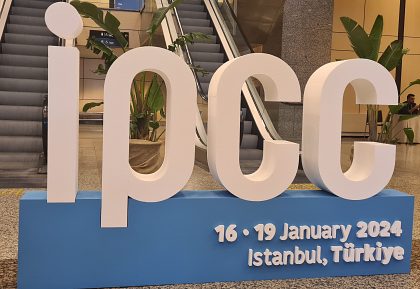
The meeting was the first in the seventh assessment cycle and was of special significance because it decided on the IPCC's scientific work program for the next seven years. Participation in the IPCC General Assembly allowed for active involvement in shaping the processes for the seventh assessment cycle.
At the 60th IPCC General Assembly, the scientific work program for the 7th assessment cycle (AC7) was decided upon:
- 2027: Special Report on Climate Change and Cities (decision from 2016 confirmed)
- 2027: Methodological Report on Short-lived Climate Forcers - SLCF (decision from 2019 confirmed)
- 2027: Methodological Report on Carbon Dioxide Removal (CDR), Utilization, and Storage of Carbon Dioxide (CCUS)
- Timeline for the Seventh Assessment Report (AR7):
- WG I: Physical Science Basis
- WG II: Impacts, Adaptation, and Vulnerability, including a separate product reviewing and updating the IPCC's 1994 guidelines on impacts and adaptation, including indicators, metrics, and adaptation methodologies
- WG III: Mitigation of Climate Change
- End of 2029: Synthesis Report of the 7th Assessment Cycle
Discussions on the IPCC work program focused on whether and how to respond to requests from the Parties to the Paris Agreement for the IPCC to provide scientific information for "Global Stocktake 2" (Decision 1/CMA.5, §184), as well as for the Global Goal on Adaptation (3/CMA.4 §21 and L.18/CMA.5 §38(d)). The GST has a five-year cycle, whereas IPCC cycles typically last about seven years. Most countries agreed that it is important for the IPCC to respond to these challenges. The General Assembly was unable to agree on preparing a special report on the latest politically relevant topics for GST 2, which could serve as a timely and balanced contribution. Reasons included a lack of consensus on whether a targeted special report is an appropriate format for the IPCC's contribution to GST 2, and also very differing views on topics relevant to GST. Therefore, many countries, including the EU, agreed that providing a comprehensive set of assessment reports from the individual working groups (AR7) is more appropriate, even though their publication by GST 2 in 2028 requires a very challenging timetable due to their broader scope.
The decision does not include a specific timeframe for the creation of working group reports. This poses a risk that the IPCC will not deliver a comprehensive set of working group reports in time for GST 2. The IPCC leadership was urged to develop a detailed timetable for the working group reports for further consideration at the next IPCC General Assembly. The "end of 2029" timeframe for the Synthesis Report would allow for the delivery of working group reports by 2028 and in time for GST 2, although perhaps not all for the technical phase ending in mid-2028.
Countries still face challenging negotiations before they can definitively start work in full with experts nominated by countries in all working groups.

